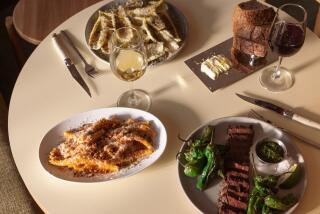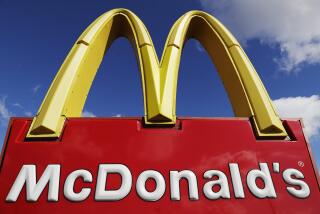Restaurants brace for a sour season as consumers lose appetite for dining out
Adele Cabot and her husband used to dine out three or four times a week, regularly spending $75 to $100 at a sushi bar sampling rainbow rolls and yellowtail nigiri sushi.
But that changed after Cabot, an adjunct professor of theater at UCLA, had to take a 6% salary cut. The couple now eat out half as much and frequent less expensive Mexican and Italian places.
“I just don’t want to spend the money to eat out a lot,” Cabot said.
With Thanksgiving this week and Christmas next month, restaurants are eager to win back customers such as Cabot who seemed to disappear amid a brutal summer for the nation’s eateries.
Restaurant owners are worried that tight corporate entertainment budgets, cash-conscious consumers and greater competition from price-cutting supermarkets will make for another dreary Christmas.
The number of people visiting restaurants has plunged for four consecutive quarters, according to NPD Group, a market research firm. Companies as small as Tender Greens, with just three restaurants, and as huge as the Denny’s chain are braced for another difficult year.
“Until the economy gets through these unemployment and foreclosure issues, we are going to have a tough time,” said Nelson Marchioli, chief executive of Denny’s Corp. of Spartanburg, S.C. “The economy has really put our customers in a tough position.”
Marchioli is talking about people such as Harry Browne of Mount Washington. Browne lost his job in information technology and won’t be buying anything more than “a value meal from a fast-food restaurant” these holidays. “I am on my last extension of unemployment benefits, so I have to really watch my spending,” he said.
To reach those consumers, Denny’s plans a television advertising blitz during key NFL and college football games as well as the Macy’s Thanksgiving Day parade.
It isn’t only mid-priced family restaurants that people are avoiding. Upscale chains such as McCormick & Schmick’s, the seafood house, and Morton’s, the steak purveyor, saw same-store sales, or sales at restaurants open at least a year, fall 18.8% and 16.8%, respectively, in the third quarter compared with a year earlier, according to Bellwether Food Group, a food industry consulting firm.
Bellwether doesn’t project an industry rebound to pre- recession levels until 2012.
The recession has taught consumers to eat out less often and to order less -- skipping alcoholic beverages, appetizers and desserts -- when they do, Bellwether said.
That’s made easier by supermarkets, which have cut prices and expanded their selection of prepared food and takeout entrees.
“We used to eat out a lot and buy just some things at the supermarket,” said Grant Cramer, who owns a small television and film production company in Los Angeles.
Now he’s cooking at home more and finds himself stocking up at the grocery store and farmers markets.
“I had a couple of projects that crashed with the economy. We had to tighten up,” Cramer said.
Christmas-season spending at bars and restaurants this year will be about $7.8 billion, according to IbisWorld Inc., a market analysis firm in Santa Monica. That’s one of the rosier industry estimates -- up almost 6% from a year ago, but that’s only because last Christmas was so lousy, the company said. It is still down 11% from the pre-recession level of $8.8 billion in 2007.
“I think it will only get tougher. People are still losing their jobs, credit is still tight, and we could see another wave of foreclosures,” said Erik Oberholtzer, co-owner of Tender Greens, a group of three restaurants based in Culver City that emphasizes locally grown food.
Restaurants are redoubling their efforts to prevent as poor a holiday season as last year’s. In particular, they are focusing on catering private parties and hosting business gatherings -- a vital source of income this time of year.
“We called back a lot of people this year who canceled on us after the economy collapsed last October,” said Joachim Splichal, chef and founder of Patina Restaurant Group, which owns Patina, Cafe Pinot and Nick & Stef’s Steakhouse, among other upscale eateries.
Splichal found that many companies wanted to do parties for their workers if for no other reason than to celebrate surviving a tough year that often included wage freezes and layoffs.
“They were all on a tight budget,” Splichal said. So to close deals, he offered a 10% discount for early bookings and then came up with all-inclusive plans, such as $60 for a three-course dinner, wine, tax and tip.
The hope is that customers will upgrade -- for example, picking more expensive wines or making other add-ons -- during the event, he said.
But he also found that many clients who still want to celebrate are downgrading from a formal dinner to a cocktail party.
Cache Restaurant & Lounge, an independent restaurant in Santa Monica, has knocked 10% off the price of private-party bookings.
“The holiday season will be decent but not great, and who is to say what is right around the corner in this economy?” said Josiah Citrin, who also owns Melisse in Santa Monica.
Wilshire Restaurant hopes to entice private parties by offering $100 gift certificates with a private-party booking.
Like many independent restaurants, Wilshire also is pushing heavily into social media to create a buzz for the establishment. It has a Facebook page and is part of OpenTable, an online reservations network. Messages sent out over its Twitter account periodically announce half-price wine nights and $1 martini specials.
California Pizza Kitchen also is looking to gain more family- and office-event business by offering a catering menu that bundles entrees to make it easier to order for groups. It also is giving an extra $20 gift card for every $100 worth purchased.
The Yard House chain has a lower threshold, offering a $10 gift card for every $50 worth purchased. It also is expanding hours at some restaurants. Previously, all of its restaurants closed on Christmas. This year its L.A. Live location in downtown Los Angeles as well as its Waikiki establishment in Honolulu will be open Christmas Day.
Denny’s, which saw same-store sales at company-owned restaurants fall 6.6% in the third quarter, plans to “look for ways to market our strengths,” CEO Marchioli said.
That means pitching the chain’s Grand Slam budget breakfasts, which start at $3.99, and launching a 6.6-ounce grilled hamburger for $6.99 to try to build lunch and dinner traffic.
But even those initiatives will leave the 1,500-restaurant chain still battling economic head winds. Research firm NPD doesn’t expect an industry turnaround any time soon.
“It is not a pretty picture,” said Bonnie Riggs, a restaurant industry analyst with NPD in Chicago. “Consumers have pulled back so much.”
In 33 years of tracking restaurant traffic, NPD “has never seen this type of a weakness for this long of a period,” Riggs said. “The industry really has its work cut out for it.”
twitter.com/latimesjerry
More to Read
Inside the business of entertainment
The Wide Shot brings you news, analysis and insights on everything from streaming wars to production — and what it all means for the future.
You may occasionally receive promotional content from the Los Angeles Times.











